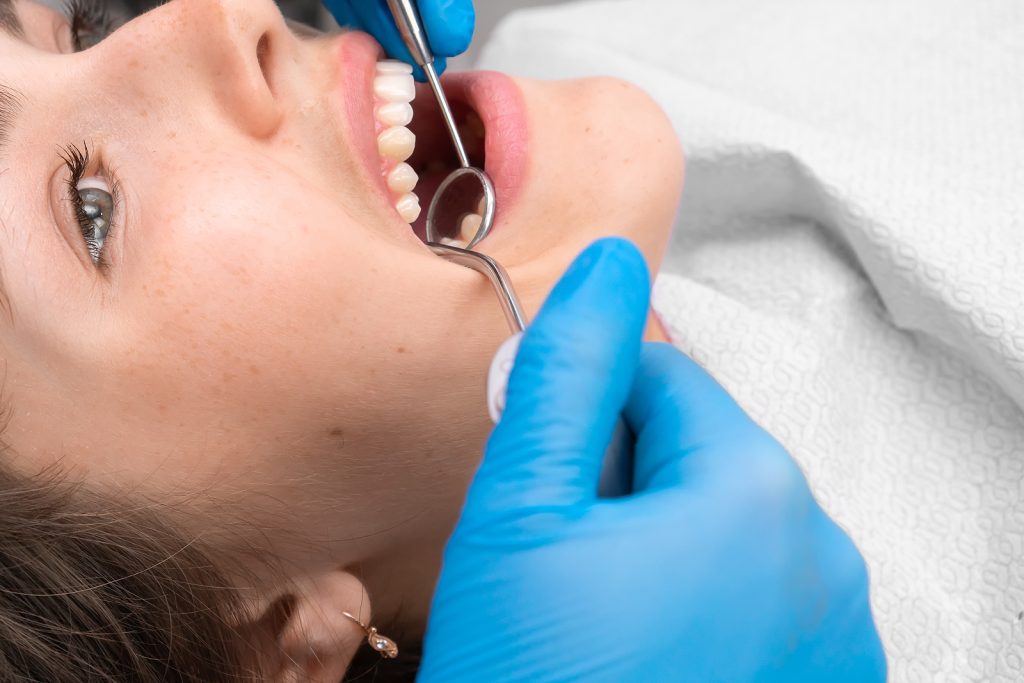
Oral hygiene is not just about maintaining a beautiful smile; it’s about ensuring the health and well-being of your teeth and gums (and by extension, your entire body!)
One common issue that many people face is tooth sensitivity. This uncomfortable condition can be triggered by various factors, making it essential to understand the causes, treatment options, and prevention strategies.
In this blog, our South Yarra dentists will delve into the world of tooth sensitivity, exploring the different reasons behind it and how you can alleviate the discomfort.
1) Worn enamel
Tooth enamel is the hard, protective outer layer of your teeth. Its purpose is to shield the sensitive dentin underneath from external factors.
However, enamel can wear down over time due to aggressive brushing, abrasive toothpaste, or the consumption of acidic foods and beverages (more on this below).
When enamel erodes, it exposes the underlying dentin, which contains microscopic tubules leading to the tooth’s nerve. As a result, you may experience sensitivity to hot, cold, sweet, or acidic stimuli.
Solution: To manage sensitivity caused by worn enamel, use a soft-bristle toothbrush and gentle brushing techniques.
Consider using desensitising toothpaste, which helps block the tubules and reduce discomfort. In some cases, your dentist may recommend dental bonding to cover the exposed dentin and alleviate sensitivity.
2) Gum recession
Gum recession occurs when the gum tissue that surrounds your teeth pulls back or wears away, exposing the tooth roots. Unlike the crown of the tooth, which is protected by enamel, the roots lack this protection, making them highly sensitive to temperature changes and other stimuli.
One of the early warning signs of gum recession is bleeding gums, which should not be overlooked as they can signal the onset of gum disease.
Swollen gums can also be a key indicator of gum issues leading to sensitivity, and should not be ignored as they might point to conditions like gingivitis.
Solution: If gum recession, gum disease, or other gum issues are causing sensitivity, your dentist can provide tailored solutions. This may include gum grafting to cover exposed roots, deep cleaning to treat gum disease, or recommending specialised oral hygiene practices to maintain gum health.
Seeking professional guidance is essential for effective treatment!
3) Tooth decay
Tooth decay, often in the form of cavities, is a common cause of tooth sensitivity.
When decay progresses and penetrates through the enamel and into the dentin, it reaches the nerve within the tooth. This can result in sharp pain or sensitivity, especially when consuming hot, cold, sweet, or acidic foods and drinks.
Solution: Treatment for tooth decay is crucial to address sensitivity and prevent further damage. It typically involves the removal of the decayed portion of the tooth and the application of a dental filling material. This process not only restores the tooth’s structure but also alleviates sensitivity.
Root canal treatment
In cases of severe decay where the nerve is affected, your dentist may recommend root canal treatment.
This procedure involves removing the infected or damaged nerve tissue and sealing the tooth to prevent further infection. While root canals have a reputation for being painful, modern techniques make the procedure comfortable. This treatment is highly effective at preserving the natural tooth and relieving sensitivity.
To prevent tooth decay and subsequent sensitivity, maintain a regular oral hygiene routine, including brushing, flossing, and using fluoride toothpaste.
Additionally, limit sugary and acidic foods, and visit your dentist for regular check-ups and cleanings to catch and address decay in its early stages.
4) Cracked teeth
Cracks or fractures in teeth can create a pathway for sensitivity. These cracks can vary in size and depth, but even small cracks can allow temperature and pressure changes to reach the nerve, causing discomfort.
If you suspect a cracked tooth is causing your sensitivity, it’s crucial to consult your South Yarra dentist promptly. Early intervention can prevent the crack from worsening and help you avoid more extensive treatments.
Solution: Repairing cracked teeth may involve dental crowns, which cover and protect the cracked tooth, preventing further sensitivity. In some cases, dental bonding may be used to seal the crack and alleviate discomfort.
To reduce the risk of cracked teeth, avoid biting hard objects, such as ice or unpopped popcorn kernels. If you grind your teeth at night, your dentist may recommend a mouthguard to protect your teeth from excessive force.
5) Acidic diet
The foods and beverages you consume can impact your tooth enamel. Acidic foods and drinks, such as citrus fruits and fizzy soft drinks, can erode enamel over time. This erosion exposes the dentin underneath and contributes to tooth sensitivity.
Solution: To minimise sensitivity caused by an acidic diet, limit your consumption of acidic foods and beverages. If you do consume them, consider using a straw to reduce contact with your teeth. Additionally, maintain a consistent oral hygiene routine to protect your enamel and overall dental health.

Sensitive teeth? Book a dental check-up today!
By understanding the various causes of tooth sensitivity and following appropriate solutions, you can manage this common dental issue and enjoy a beautiful, pain-free smile.
Maintaining good oral hygiene practices, visiting your dentist regularly, and seeking professional guidance for sensitive teeth care are essential steps toward addressing and preventing tooth sensitivity.
Dealing with uncomfortable sensitivity? Book an appointment with Dental Care Group today!
Dr Zelman Lew and the team are ready to welcome you to our state-of-the-art clinic, located in the heart of Armadale, right opposite Malvern Central shopping centre.
Book online now or speak to one of our friendly team by calling (03) 9509 1500.

